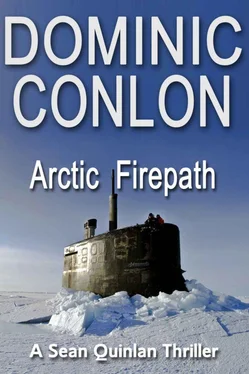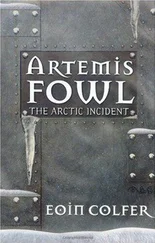From his observation point Sean saw the chauffeur speaking into his mobile. Cautiously he stepped out, drawing his gun and holding it pointed down, along the seam of his jeans. Sean drew a bead through the driver’s window and shot him. The man went down and some pedestrians screamed as they realised what was happening.
Sean darted into the moving traffic, dodging between the cars until coming abreast of the stationary car. He leaned in through the driver’s open window and placed his gun inside, over the top of the driver’s seat. At the last moment he glimpsed the bodyguard with his arm around Levushka, gun pressed against the boy’s head. Sean stopped.
Sweat beads lined the furrows on the man’s face. Sean let his gun hand dip behind the front seat. The bodyguard motioned for Sean to drop the gun altogether. Without changing his expression, Sean fired.
The round punctured the seat and entered the man’s gut. Surprise registered on his face. Sean wrenched his gun; it came away easily.
He studied Levushka. The boy was in shock, some of the bodyguard’s blood covering his clean white shirt. Levushka dabbed the stain helplessly. Sean ran round and yanked the rear door open. Reaching in, he pulled the boy out by the jacket.
‘Get the chauffeur’s mobile.’
Levushka looked puzzled.
‘Now!’ barked Sean.
Sean went back into the car to retrieve the dying bodyguard’s phone. Levushka crouched next to the fallen chauffeur, searching through the man’s jacket. He found the phone and lifted it high so that Sean would notice.
‘Good. Let’s go!’ Sean yelled in Russian. He sprinted through the stationary cars, away from the scene. A moment later, Levushka raced after him.
At 30,000 thousand feet the SU-271B barrelled through the clouds. The pilot switched his Heads Up Display (HUD) to present the output from the Forward-Looking Infra-Red pod mounted on the wing. The image, overlaid with a visible-spectrum picture, was pretty much as the Russian expected — blank. Still 1000 kilometres from the source of the radio message, the aircraft was too far away for the cryogenically cooled sensors to make out any thermal signatures.
He checked his instruments. Flying blind in an Arctic storm was no picnic; the airframe shook violently and was being thrown about the sky — and so too was his stomach. But the all-weather SU-271B was more than up to the job; its design was based on the most successful fighter-bomber in the Russian air force. The immensely capable model, fondly nicknamed as Platypus because of its distinctive nose, was classified as super-manoeuvrable.
The pilot thumbed a switch on the console to listen again to the exchange he had first heard during his briefing. The communication was fleeting, most of it obscured by static.
‘LK-80 to base. Our ship has been …. by American… We are being …. Request immediate assistance to … Captain Bur…’
A meteorologist explained that the cause of the poor signal was undoubtedly due to a developing storm in the region. Nevertheless, when the message was confirmed, senior military personnel became involved. They wanted to send a squadron of fighter jets to investigate, but in the end the gale force winds were a deciding factor and only one plane was tasked to reconnoitre. The pilot grinned, believing they had instructed only one aircraft in order to minimise the potential loss of a fleet of very expensive warplanes.
One hour and five minutes later the SU-271B arrived in the vicinity, and the HUD showed several thermal traces. These were grouped around six large structures, with many smaller sources dotted in-between. The plane moved on and three kilometres away the HUD displayed a ship.
He leaned forward, flipping a switch which threw up a revolving 3D drawing of LK-80 alongside. Comparing the two images side by side, there was no doubt he had found the right vessel. ‘Platypus One to LK-80. What is your situation?’
On board ship the radio operator listened as the pilot repeated his message. Major Pierce nodded, and Feliks stepped forward to pick up the mike. As he was about to speak, Major Pierce pulled back his Parka to reveal a huge sheathed knife hanging from his belt.
Feliks cleared his throat. ‘Platypus One, Feliks Chayka speaking. I’m chief engineer of LK-80. Our situation is difficult.’ He looked uncertainly around the waiting men. ‘The reactor is partly shutdown because of a technical problem and the long range radio on the bridge is temperamental.’
‘I received a garbled report from LK-80 requesting assistance. Who initiated contact?’
Feliks stared at the microphone, and regarded Major Pierce nervously. The big man drew his finger across his throat, indicating Feliks should terminate the connection.
‘We’re not sure Platypus one. I have to go now — I need to attend the reactor.’
‘Please put Captain Burak on the line.’ The speakers conveyed no empathy in the pilot’s voice.
‘Ah, he is indisposed at present. Suffering from food poisoning. I am in charge until Captain Burak makes a recovery.’
The speaker was silent for a moment. ‘What are all the heat signatures I’m getting? I guess there are several hundred camped out on the ice, less than 5 km from you.’
Feliks glanced apprehensively at Major Pierce. ‘I am aware Platypus One. They are part of an American rescue effort. Our Captain offered the ship as a base of operations for their downed submarine.’
‘Your request to provide assistance to the Americans was turned down. Why did you disobey your orders?’
Feliks swallowed. ‘We had many radio communications problems. I was not aware you forbade our help. Captain Burak decided that aiding the rescue would be the best course of action in the long run.’
‘Right. I shall report your actions. Is there anything else you need?’
Feliks glanced at Major Pierce. He shook his head. ‘No, nothing at the moment.’
‘Another Flanker will arrive soon to supply radio communications with base. Platypus One out.’
‘Thank you Platypus One.’ Feliks saw Major Pierce frown as he replaced the mike.
* * *
The sonar-phone bleeped but no-one picked it up. Many were suffering from a lack of oxygen, with most sitting and some lying full length on the floor of the submarine. Eventually the XO reached for the phone, his actions slow and laboured. He listened for a second before passing it to the Captain. ‘It’s the rescue module, for you.’
The Captain held the handset to his ear, trying desperately to keep focused. After a minute he replied with a terse ‘thank you’ and handed the phone back.
At the same time they heard clanging noises from above. Captain White assumed the Pressurised Rescue Module was attempting to mate with the exterior hatchway of the escape trunk. A ragged cheer went up from the subdued crew. The Captain had previously decided that the first group of men in the trunk should be able-bodied. He expected the PRM would lower oxygen cylinders and medicines, giving the sick some immediate relief and making preparations for their rescue easier.
The sounds continued, followed by a sharp hiss of escaping air. For a few moments silence descended. Every man listened out for the sound of the access hatch being opened. Then they heard it — the slight hiss as air pressure in the submarine and PRM equalised and the clang of the hatch being secured. There was another, stronger cheer.
The group in the escape trunk reached up to take the cylinders of oxygen and portable CO2 scrubbers as they were lowered down to them. Two minutes later a man descended from the hatchway and crawled over recumbent bodies into the body of the sub. He crossed to where the Captain and XO sat, backs propped against the bulkhead. Crouching, he saluted smartly.
Читать дальше












